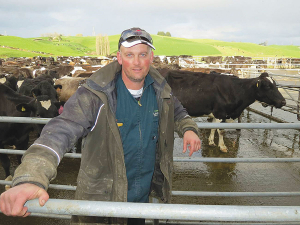Dairy farmers are facing two big challenges in falling land prices and increasingly restricted access to capital, says the Australasian financial advisor Findex.
This means farmers must practise robust budgeting and get on the front foot with their bank manager.
Federated Farmers national dairy chair Chris Lewis agrees these factors appear to be affecting farmers.
Findex head of agribusiness Hayden Dillon says “access to funding is becoming more of an issue despite the good payout, and this is putting some farmers under pressure”.
There is a concentration of high debt: 35% of dairy sector debt is held by farms with at least $35 of debt per kilogram of milk solids.
Dillon points to several factors combining to cause the credit squeeze.
“Firstly, changes in OIO legislation, coupled with uncertainty about the regulatory outlook for the overall sector, has led to a softening of land prices driven by low demand for dairy infrastructure, limiting exit options for both farmers and lenders,” he says.
“On top of this, the RBNZ is closely scrutinising the sector as the spectre of new RBNZ regulations on capital requirements to protect the industry from a 1 in 200 year event begin to take effect.”
This could increase the cost of capital as banks look to protect their margins.
“And it has created an environment of increased scrutiny of farmers by their bankers,” says Dillon. Banks will move to where they see improved returns and lower risk, he says.
“Banks are deleveraging dairy and moving towards horticulture as shown by the recent six monthly RBNZ report on financial stability. This showed dairy experiencing only a 1% increase in lending while horticulture lending growth was running at 19%.”
There is also a move away from interest only loans, with banks expecting principal and interest repayments on loans, which will further limit cash availability, Dillon says. To this add farmers’ need to spend more on environmental compliance and the rising cost of labour and fuel, so they now face a balancing act with creditors and cashflow.
With options for sale limited in the near future, Dillon is encouraging farmers to be proactive with their lender to develop a sound repayment strategy in order to sustainably service debts, which is possible with a robust business management plan and the help of an adviser.
“Farmers can’t afford to take a back seat in this process, otherwise they will just have to take the number the bank gives them.”
Dillon says Findex is increasingly finding farmers’ budgets do not have adequate buffers, causing them to run short of working capital. So they must be well prepared and represented in presenting their financials to the bank.
“Farmers need independent advice on their budgeting assumptions to make sure they are realistic.”
This requires ‘sensitivity testing’ to ensure the business can cope with changes in income and expenses throughout the season, and allowing adequate buffers when calculating how much principal a farmer can repay each season.
Chris Lewis says the Findex summing up of the situation appears correct.
Evidence of this is hard to gather, Lewis says, because discussions around farmers’ kitchen tables are always confidential and they don’t talk directly about their own issues. But Findex has in general inferred that these factors are having an effect.


















